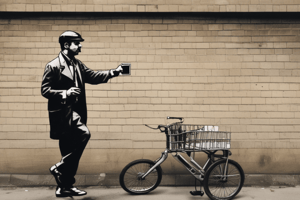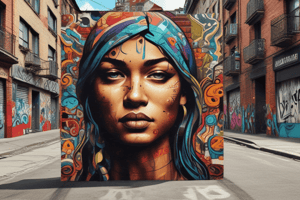Podcast
Questions and Answers
What decade is known for the emergence of early forms of street art like graffiti and tagging?
What decade is known for the emergence of early forms of street art like graffiti and tagging?
- 1950s
- 1960s (correct)
- 1980s
- 1990s
Which city became a significant hub for street art during the 1980s?
Which city became a significant hub for street art during the 1980s?
- Los Angeles
- Chicago
- New York City (correct)
- Paris
Who are two prominent artists that gained recognition in the 1980s for their contributions to street art?
Who are two prominent artists that gained recognition in the 1980s for their contributions to street art?
- Andy Warhol and Roy Lichtenstein
- Jean-Michel Basquiat and Keith Haring (correct)
- Cy Twombly and Jean Dubuffet
- Banksy and Shepard Fairey
Which art style uses cut-out templates to create sharp lines and patterns?
Which art style uses cut-out templates to create sharp lines and patterns?
What is a significant legal issue street artists may face?
What is a significant legal issue street artists may face?
Which of the following best describes muralism?
Which of the following best describes muralism?
In which century did street art begin to incorporate technology and digital sharing?
In which century did street art begin to incorporate technology and digital sharing?
What role does street art often play in society?
What role does street art often play in society?
What ethical dilemma does street art often raise?
What ethical dilemma does street art often raise?
What does 'post-graffiti' focus on in street art?
What does 'post-graffiti' focus on in street art?
Which type of street art involves assembling small pieces of materials to create images?
Which type of street art involves assembling small pieces of materials to create images?
What is a significant effect of street art on urban landscapes?
What is a significant effect of street art on urban landscapes?
Where do street artists primarily sell their work?
Where do street artists primarily sell their work?
What is a common form of collaboration for street artists?
What is a common form of collaboration for street artists?
Which street art movement is characterized by bold lettering and vibrant colors?
Which street art movement is characterized by bold lettering and vibrant colors?
Why do some people view street art as a form of vandalism?
Why do some people view street art as a form of vandalism?
Flashcards are hidden until you start studying
Study Notes
The Rise of Street Art
- Street art originated in the 1960s and 1970s as a form of social commentary and resistance
- New York City became a hub for street art in the 1980s with artists like Jean-Michel Basquiat and Keith Haring gaining recognition
- In the 1990s, street art gained international recognition with artists like Banksy and Shepard Fairey
- In the 21st century, street art has embraced technology with artists using digital platforms to share their work and engage their audience
Exploring Different Styles & Techniques
- Graffiti is characterized by bold colors, intricate patterns, and dynamic lettering
- Stencil art utilizes cut-out templates to create sharp lines, repetitive patterns, and a layer of precision in street art
- Abstract art explores non-representational forms, using textures, colors, and shapes to evoke emotions and ideas
- Mosaic art assembles small pieces of materials such as tiles or glass to create intricate patterns and images
Street Art: A Voice for Social Change
- Street art often serves as a platform for raising awareness about social issues
- Artists use their work to highlight injustices, criticize policies, and inspire change
- Murals depicting environmental destruction or protesting racial inequality serve as powerful visual reminders of urgent problems
Street Art: Artistic Expression
- While street art can be deeply political, it also embraces artistic freedom and self-expression
- Artists use their creativity to express their unique perspectives and connect with their communities
- The vibrant colors, textures, and styles of street art contribute to a vibrant and engaging urban landscape
The Legality & Ethics of Street Art
- Street art often operates in a gray area of the law, as it involves applying artwork to public or private property without permission
- This can lead to legal issues ranging from property damage charges to copyright infringement
- Many cities have specific regulations regarding Street art , with some areas designated as legal for artistic expression, while others are strictly prohibited
Ethical Dilemmas
- Street Art raises ethical questions about property rights, public space, and the boundaries of artistic expression
- Some argue that street art can be considered vandalism, while others view it as a form of urban renewal and community engagement
- Artists and communities must navigate these ethical considerations, balancing artistic freedom with respect for property rights and the needs of the public
Notable Street Art Movements Around the World
- Graffiti, originating in New York City, is characterized by bold lettering, vibrant colors, and intricate patterns
- Muralism emphasizes large-scale artwork, often depicting social or political themes and engaging local communities
- Street art is a broad category encompassing various styles, often challenging traditional art conventions and exploring urban spaces
- Post-graffiti, building upon graffiti’s foundations, incorporates abstract forms, geometric patterns, and a focus on visual impact
The Business of Street Art
- Street artists sell their work through galleries, online platforms, and street markets
- Artists create bespoke murals or installations for private clients or businesses
- Artists grant permission for their artwork to be used on products or merchandise
- Street artists collaborate with brands, musicians, and other creatives for unique projects
Studying That Suits You
Use AI to generate personalized quizzes and flashcards to suit your learning preferences.




